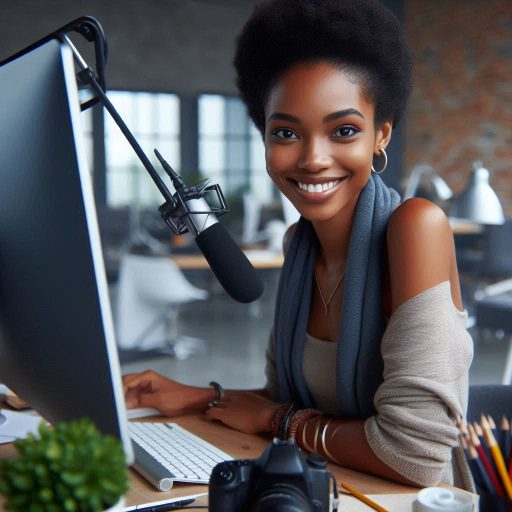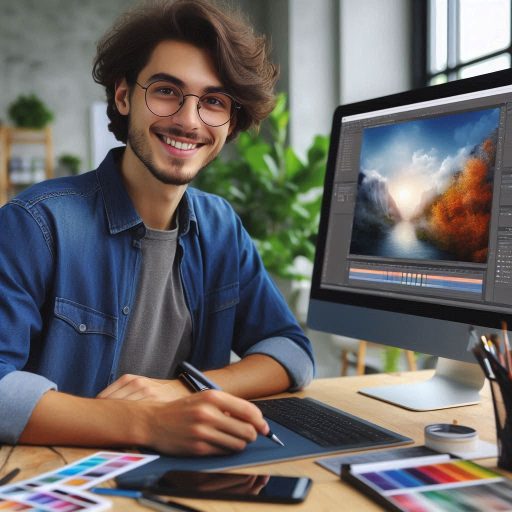Introduction
Briefly introducing the topic, it’s essential to highlight the significance of a conducive workspace for digital artists.
The environment in which artists work can greatly influence their creativity, productivity, and overall well-being.
Proper lighting is crucial for digital artists as it affects color perception and eye strain.
Natural lighting or adjustable LED lights can create an optimal working environment.
Comfortable seating, adjustable desks, and ergonomic peripherals are vital for maintaining good posture and avoiding strain.
A well-designed workspace can enhance concentration and physical health.
Organized workspaces help digital artists stay focused and inspired.
Storage solutions, such as drawers and shelves, can keep tools and materials within reach, streamlining workflow and boosting productivity.
Personalized decor can create a motivational and inspiring atmosphere.
Artwork, plants, and meaningful objects can make the workspace feel like a creative sanctuary, enhancing mood and sparking ideas.
Integrating technology in the workspace, such as dual monitors, graphics tablets, and efficient computer systems, can enhance digital workflow and overall efficiency.
Utilizing the latest tools can improve artistic output and quality.
A well-designed workspace is essential for digital artists in fostering creativity, maximizing productivity, and promoting overall well-being.
By paying attention to lighting, ergonomics, organization, personalization, and technology, artists can create an optimal environment that nurtures their artistic endeavors.
Ergonomics
The importance of having a comfortable and ergonomic workspace for digital artists
A comfortable and ergonomic workspace is crucial for digital artists.
It impacts both productivity and physical health.
Proper ergonomics help prevent strain and injuries during long hours of work.
Firstly, having a chair with adequate lumbar support is essential.
An ergonomic chair helps maintain proper posture and reduces back pain.
It ensures that artists can work comfortably for extended periods.
Transform Your Career Today
Unlock a personalized career strategy that drives real results. Get tailored advice and a roadmap designed just for you.
Start NowSecondly, desk height plays a significant role in ergonomic setup.
The desk should be at a height that allows the artist’s elbows to rest at a 90-degree angle.
This position minimizes shoulder and neck strain, promoting better comfort and efficiency.
Impact of Proper posture, chair, desk height, and lighting on productivity and physical Health
Proper posture is another vital aspect.
Digital artists should sit with their feet flat on the ground and their back straight.
This posture reduces the risk of developing musculoskeletal issues and enhances overall comfort.
Lighting is equally important. Good lighting reduces eye strain and prevents headaches.
Natural light is ideal, but adjustable desk lamps can also help.
Artists should position their light source to avoid glare on screens.
Moreover, an adjustable monitor stand is beneficial.
It allows the monitor to be at eye level, reducing neck strain.
The screen should be about an arm’s length away from the artist, ensuring clarity and comfort.
In summary, an ergonomic workspace is crucial for digital artists.
It improves posture, supports physical health, and boosts productivity.
Investing in a comfortable chair, proper desk height, and adequate lighting pays off in both comfort and efficiency.
Read: How to Turn Your Digital Art into NFTs
Organization
Significance of an organized workspace for digital artists
An organized workspace is crucial for digital artists. It significantly impacts productivity, creativity, and overall well-being.
A clutter-free environment fosters a clear mind. When digital artists maintain an orderly space, they can focus better and work more efficiently.
Clutter distracts and overwhelms. It hampers creativity and slows down progress.
Disorganized tools and materials make finding what you need difficult.
Transform Your Career Today
Unlock a personalized career strategy that drives real results. Get tailored advice and a roadmap designed just for you.
Start NowThis frustration can interrupt the creative flow and delay projects.
An organized workspace, on the other hand, allows for a smooth workflow.
It enables quick access to necessary tools, enhancing productivity and focus.
The benefits of having a clutter-free environment for creativity and focus
A tidy workspace also helps in maintaining mental clarity.
An artist surrounded by chaos may feel stressed and unmotivated.
In contrast, a well-organized area promotes a sense of calm and control.
This positive environment supports sustained creative efforts and reduces anxiety.
Moreover, organization encourages discipline.
It sets a routine for keeping the workspace in order.
Regularly sorting and decluttering can prevent the buildup of unnecessary items.
This discipline translates into better work habits and more consistent artistic output.
In summary, the significance of an organized workspace cannot be overstated.
It creates an environment conducive to creativity and focus.
A clutter-free space supports mental clarity and enhances productivity.
By keeping their workspace tidy, digital artists can foster a more efficient, enjoyable, and successful creative process.
Read: Skills Needed to Become a Ceramic Artist
Inspiring Decor
Role of decor in creating an inspiring workspace for digital artists
Creating an inspiring workspace is crucial for digital artists.
The right decor can significantly impact creativity and motivation.
A well-decorated workspace can transform a mundane environment into a haven of inspiration.
First, consider the role of decor in your workspace.
Transform Your Career Today
Unlock a personalized career strategy that drives real results. Get tailored advice and a roadmap designed just for you.
Start NowPersonalizing your space with meaningful items fosters a sense of belonging.
Displaying art that resonates with you can spark creativity.
Surround yourself with objects that motivate and energize you.
Colors play a vital role in setting the mood.
Choose colors that align with your creative process.
Bright, vibrant hues can stimulate energy and excitement.
Softer tones may promote relaxation and focus.
The right color palette helps in creating an environment that supports your artistic endeavors.
How decorations, colors, and artwork can enhance creativity and motivation
Incorporate artwork and decorations that inspire you.
Display pieces that challenge and stimulate your imagination.
This could include art from favorite artists, motivational quotes, or abstract designs.
These elements can influence your mood and provide fresh perspectives.
Arranging your decor thoughtfully enhances functionality.
Ensure that decorations do not clutter your workspace.
Maintain a balance between inspiration and practicality.
A clean, organized space with inspiring decor can help you stay focused and motivated.
Lighting is another critical aspect of decor.
Adequate lighting enhances your ability to work effectively.
Natural light or well-placed lamps can reduce eye strain and create a pleasant atmosphere.
Proper lighting also highlights your decor, making your workspace more inviting.
Transform Your Career Today
Unlock a personalized career strategy that drives real results. Get tailored advice and a roadmap designed just for you.
Start NowIn summary, inspiring decor is vital for a digital artist’s workspace.
Thoughtful choices in colors, artwork, and decorations create an environment that enhances creativity and motivation.
A personalized and well-lit space can significantly boost your artistic productivity and enjoyment.
Read: Creating Art for Video Games: A Digital Artist’s Guide

Technology Setup
When it comes to creating digital art, having the right technology setup is crucial for a digital artist.
Let’s delve into the importance of having the right tools in your workspace.
Impact of a Fast Computer
A fast computer is essential for digital artists as it ensures smooth performance while working on complex projects.
Rendering large files, editing high-resolution images, and running multiple applications simultaneously require a powerful processor and ample RAM.
A slow computer can severely hinder productivity and creativity, leading to frustration and delays in completing projects.
Investing in a fast computer with cutting-edge hardware can significantly improve workflow efficiency and overall output quality.
High-Quality Monitor
A high-quality monitor is a must-have for digital artists as it allows them to view their work with accuracy and precision.
Color accuracy, resolution, and screen size are important factors to consider when choosing a monitor for digital art creation.
Calibrating the monitor regularly ensures that the colors in the artwork appear consistent across different devices and print mediums.
An inferior monitor can distort colors, affecting the final output of the artwork and leading to inaccuracies in the creative process.
Good Internet Connection
A good internet connection is vital for digital artists who rely on online resources, cloud storage, and collaboration with clients or other artists.
Fast upload and download speeds are essential when transferring large files, streaming tutorials, or participating in virtual meetings.
Unreliable internet connectivity can disrupt workflow, cause file corruption, and lead to missed deadlines in a digital artist’s career.
Investing in a stable internet connection not only improves productivity but also enhances communication and networking opportunities within the creative community.
Overall, having the right technology setup in a workspace for digital artists is paramount to achieving optimal workflow efficiency, creative output, and professional success.
Read: Using Social Media to Promote Digital Art
Transform Your Career Today
Unlock a personalized career strategy that drives real results. Get tailored advice and a roadmap designed just for you.
Start NowPersonalization
The value of personalizing the workspace to fit the needs and preferences of the digital artist
Personalizing your workspace is crucial for digital artists.
It enhances both comfort and productivity.
Every artist has unique needs and preferences.
Tailoring your environment to these needs can significantly boost creativity and efficiency.
Firstly, a personalized workspace ensures that you have everything you need within reach.
Customizing your desk layout and tool placement saves time and minimizes distractions.
When your tools are organized to match your workflow, you can focus more on creating art rather than searching for supplies.
Additionally, personal touches can make your workspace more inviting.
Adding elements like artwork, inspirational quotes, or preferred colors creates a motivating atmosphere.
These personal touches help build a space where you feel connected and comfortable, which can enhance your overall creative process.
How customization can lead to a more comfortable and motivating work environment
Comfort is another key benefit of personalization.
Adjusting your chair, desk height, and lighting to suit your physical needs prevents strain and discomfort.
A well-fitted chair and proper lighting can reduce fatigue and improve your focus, allowing you to work for longer periods without physical discomfort.
Moreover, personalization allows you to set up a space that aligns with your creative process.
Whether it’s a specific color scheme, type of chair, or particular arrangement of equipment, customization helps create an environment where you can thrive.
This tailored setup can make work more enjoyable and less stressful.
In summary, personalizing your workspace is not just about aesthetics.
It is about creating a functional and inspiring environment that supports your artistic endeavors.
Investing time in customization leads to a more comfortable and motivating space, ultimately enhancing your creative output.
Natural Light
Benefits of natural light in a workspace for digital artists
Natural light plays a crucial role in creating an ideal workspace for digital artists.
Transform Your Career Today
Unlock a personalized career strategy that drives real results. Get tailored advice and a roadmap designed just for you.
Start NowIt offers numerous benefits that enhance both productivity and well-being.
Firstly, natural light improves mood.
Exposure to daylight boosts serotonin levels, which helps in maintaining a positive outlook.
A workspace bathed in natural light can make artists feel more energetic and focused, which is essential for creative work.
Moreover, natural light reduces eye strain.
Working under artificial lighting can cause visual fatigue, especially during long hours in front of a screen.
Natural light provides a more balanced and softer illumination, which is easier on the eyes.
This reduces the likelihood of headaches and eye discomfort, allowing artists to work longer without strain.
How exposure to natural light can improve mood, reduce eye strain, and boost creativity
Additionally, natural light enhances creativity.
It has been shown that exposure to daylight can stimulate creative thinking and problem-solving skills.
A well-lit workspace encourages a free flow of ideas and can lead to more innovative artistic outcomes.
Incorporating natural light into an artist’s workspace involves positioning the desk near windows or using daylight-simulating bulbs.
The goal is to create a space where natural light is abundant and consistent throughout the day.
Overall, natural light is not just a pleasant feature; it is an essential component of a productive digital art environment.
It positively influences mood, alleviates eye strain, and fosters creativity, making it a valuable asset for any artist’s workspace.
Noise Level
Impact of noise levels on productivity and focus for digital artists
High noise levels can have a significant impact on the productivity and focus of digital artists.
Distractions can disrupt their creative process and hinder their ability to concentrate on their work.
Ways to minimize distractions and create a quiet work environment
Here are ways to minimize distractions and create a quiet work environment:
- Invest in noise-cancelling headphones to block out external sounds and create a cocoon of silence.
- Designate a dedicated workspace away from high-traffic areas in your home or studio to reduce noise disturbances.
- Set boundaries with family members or roommates to ensure that they understand the importance of a quiet environment for your work.
- Use soundproofing materials such as acoustic panels or curtains to absorb and dampen noise within your workspace.
- Establish a daily routine that includes designated quiet hours where interruptions are minimized, allowing you to focus on your digital art projects without distractions.
- Consider working during off-peak hours when ambient noise is at its lowest, such as early mornings or late evenings, to maximize your concentration and productivity.
- Implement digital tools like white noise machines or ambient sound playlists to mask background noise and create a more conducive work environment for digital art creation.
- Practice mindfulness techniques such as deep breathing or meditation to center yourself and block out external distractions, enhancing your ability to focus on your digital art projects.
By implementing these strategies to minimize noise levels and create a quiet workspace, digital artists can optimize their productivity and enhance their creative output.
Conclusion
The main points discussed in the blog post
- Creating an Inspiring Environment: Digital artists require a space that stimulates creativity and focus.
- Comfort and Ergonomics: A good workspace promotes physical well-being and prevents fatigue and strain.
- Organizational Efficiency: An organized workspace facilitates smooth workflow and increases productivity.
- Lighting and Color: Proper lighting and color schemes can enhance mood, energy, and concentration.
- Personalization and Inspiration: A personalized workspace with art, objects, and tools can boost motivation and morale.
- Technology Integration: A well-equipped workspace with reliable technology is essential for digital artists.
- Collaboration and Networking: A good workspace can encourage collaboration with other artists and foster a sense of community.
A good workspace is crucial for digital artists’ creativity, productivity, and overall well-being.
Transform Your Career Today
Unlock a personalized career strategy that drives real results. Get tailored advice and a roadmap designed just for you.
Start NowIt is not just about aesthetics but also functionality, comfort, and inspiration.
By investing in creating an optimal workspace, digital artists can significantly improve the quality of their work and enhance their artistic journey.
Remember, the workspace is not just a physical place, but a reflection of the artist’s mindset and creative spirit.
[E-Books for Sale]
The Big Book of 500 High-Paying Jobs in America: Unlock Your Earning Potential
$19.99 • 500 High-Paying Jobs • 330 pages
Explore 500 high-paying jobs in America and learn how to boost your career, earn more, and achieve success!
See All 500 High-Paying Jobs of this E-Book
1001 Professions Without a Degree: High-Paying American Jobs You Can Start Now
$19.99 • 1001 Professions Without a Degree • 174 pages
Discover 1001 high-paying jobs without a degree! Unlock career tips, skills, and success strategies for just $19.99!




